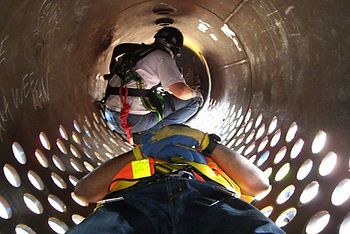Confined Space Training: Why it Matters
- mlh290
- Jun 20, 2023
- 2 min read
Confined spaces pose inherent risks and hazards that demand specialized knowledge and skills for safe operation. In the construction

industry, where confined spaces are common, comprehensive confined space training is of paramount importance. This article explores the significance of confined space training and its role in ensuring the safety of workers and the successful execution of construction projects.
Ensuring Worker Safety:
Confined space training is vital for safeguarding the well-being of construction workers. These spaces, characterized by limited entry and exit points, inadequate ventilation, and potential exposure to toxic substances, present significant dangers. Proper training equips workers with the knowledge to recognize potential hazards, implement appropriate safety measures, and effectively respond to emergencies. From understanding the correct use of personal protective equipment (PPE) to learning rescue techniques, training instills a culture of safety, reducing accidents, injuries, and fatalities within confined spaces.
Mitigating Legal and Financial Risks:
Compliance with regulations and standards is crucial for construction companies to avoid legal and financial ramifications. Failure to provide confined space training can result in hefty fines, litigation, reputational damage, and even project delays. Employers who prioritize comprehensive training demonstrate their commitment to workplace safety and adherence to industry standards. By ensuring that workers are adequately trained, construction companies mitigate potential liabilities, protect their reputation, and create a safer work environment, fostering productivity and efficiency.
Enhancing Project Execution:
Confined space incidents can disrupt construction projects, causing delays, increased costs, and negative impacts on overall productivity. Through confined space training, workers gain the skills necessary to identify potential risks, establish effective communication channels, and implement proper protocols. This knowledge allows construction teams to plan and execute projects with a heightened level of safety and efficiency. By reducing the likelihood of accidents and emergency situations, training enhances project continuity, minimizes downtime, and optimizes resource utilization, ultimately leading to successful project completion.
Continuous Improvement and Adaptability:
Confined space training in the construction industry is not a one-time event but an ongoing process. As new technologies, regulations, and best practices emerge, training programs must evolve to ensure workers remain up to date with the latest safety measures. By fostering a culture of continuous learning, construction companies empower their workforce to adapt to changing circumstances, mitigating risks and promoting overall safety.
Confined space training is an indispensable element in the construction industry, safeguarding the lives of workers, mitigating legal and financial risks, and optimizing project execution. By investing in comprehensive training programs and fostering a safety-conscious environment, construction companies demonstrate their commitment to protecting their workforce, complying with regulations, and achieving successful project outcomes.





















Comments